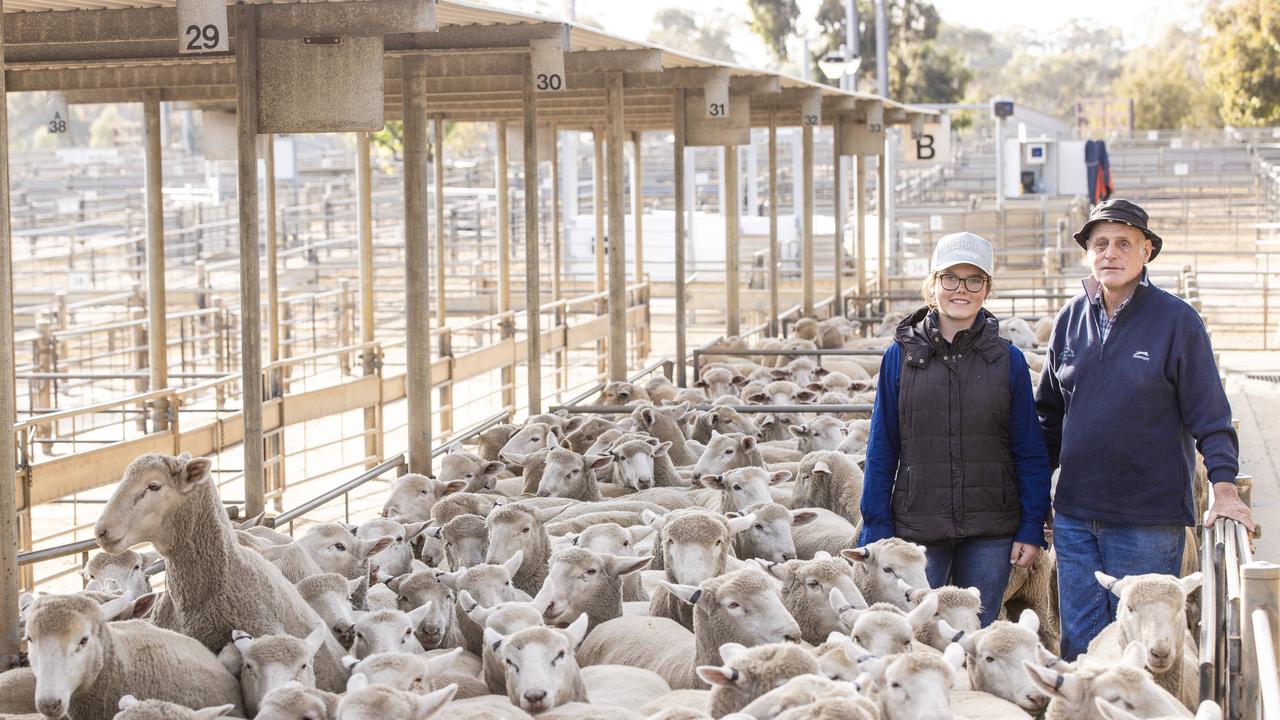Deniliquin store sheep sale: Merino and crossbred ewe prices revealed
Crossbred ewes failed to make more than $300 at the Deniliquin store sheep sale where there was a yarding of 30,000.
A small crowd and tougher than expected prices at the Deniliquin sheep sale last week has raised questions about producer confidence and supply versus demand dynamics for store ewes.
None of the crossbred ewes in the 30,000 head yarding managed to sneak above $300 per head, with young Merino ewes that were part of a noted flock dispersal claiming the top price of $335.
Agents did pass some sheep in tough day for auctioneers as they faced a limited pool of buyers that were reluctant to offer starting prices and when they did it was generally at much lower levels than the industry has been witnessing.
Such was the case with the opening pen of 229 first-cross ewes sold account Telko. They were April/My 2021 drop, November shorn and ticked the boxes of being muesled, gudair vaccinated and had even been scanned empty as an assurance to buyers no rams had got into the mob.

Agents called for $320. After silence an offer of $200 was made, this was then jumped over by another buyer at $250. The pen eventually sold for $298 to TB White of Ballarat.
By working hard agents were able to build rates for the better presented and grown ewes to within the lower ballpark of expectations. Although many vendors told The Weekly Times that prices had been $20 to $30 below what they had hoped.
A feature of the yarding was the dispersal of the Belubla Merino flock area after the property near Tocumwal was sold last year.
Big framed Charinga blood sheep in good condition and carrying 3-months of wool, the lead pen of 434 June/July 2020 drop ewes topped at $335, followed by the second cut at $294. The 2019 ewes made $274, and the 2018 at $248.
Where the market got tough was on the older ewes, with the 2017 drop Belubla’s only making $175, which on size and condition was arguably under kill value.
The other section of the sale to struggle was the general run of unjoined young Merino ewes, with the bulk selling for less than $200 per head.
Marc Braybon, auctioneer for Nutrient Deniliquin, said the market hadn’t lived-up to the good feed conditions that existed across most of Victoria and NSW.
“It is a disappointing crowd the sale has lacked some (bidding) punch,’’ he said: “Coming into this sale the recipe looked as good as you would like to see with plenty of feed and stubbles, the only thing really going against it was the tougher mutton job.
“The restricted demand and buying we are seeing today is a hard one to figure out really.’’
Many onlookers pointed the finger at the current Covid-19 mess at abattoirs as stripping confidence from buyers.
“There is a lot of apprehension out there about what direction this lamb market could go,’’ said Riverina agent Mark Ryan.
Agent John Serong, Black & Co at Wagga Wagga, said there was perhaps a crisis of confidence as people watched the impact of Covid. He bought 760 crossbred ewes after the market was softer than he anticipated.
“The market has been a lot softer than we thought, I think it comes down to this Covid-19 issue and mutton being $20 to $30 cheaper in the last fortnight,’’ he said.
Although Mr Braybon queried wether the supply of sheep was now matching or starting to exceed demand.
“There has been a lot of sheep come out of Western Australia again and maybe people have realised there is a few sheep about in the East now,’’ he said.
Two pens of scanned-in-lamb young Merino ewes made over $300, at $310 and $312, but only after auctioneers stood their ground and said they would start the mobs any lower than $300.
A pen of young Merino ewes that were scanned in lamb to Border Leicester rams were passed in at $330.
There was nearly 30,000 sheep in the yarding, and they sold to a mix of north and south orders with meat buyers also operating on some of the older ewes.




